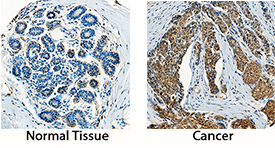Human PDGF-AA Antibody Summary
Ser87-Thr211
Accession # P04085
Applications
Please Note: Optimal dilutions should be determined by each laboratory for each application. General Protocols are available in the Technical Information section on our website.
Scientific Data
 View Larger
View Larger
Cell Proliferation Induced by PDGF‑AA and Neutralization by Human PDGF‑AA Antibody. Recombinant Human PDGF-AA (Catalog # 221-AA) stimulates proliferation in the NR6R-3T3 mouse fibroblast cell line in a dose-dependent manner (orange line). Proliferation elicited by Recombinant Human PDGF-AA (25 ng/mL) is neutralized (green line) by increasing concentrations of Goat Anti-Human PDGF-AA Antigen Affinity-purified Polyclonal Antibody (Catalog # AF-221-NA). The ND50 is typically 0.1-0.3 µg/mL.
 View Larger
View Larger
PDGF‑AA in Human Breast and Breast Cancer Tissue. PDGF-AA was detected in immersion fixed paraffin-embedded sections of human breast and breast cancer tissue using Goat Anti-Human PDGF-AA Antigen Affinity-purified Polyclonal Antibody (Catalog # AF-221-NA) at 5 µg/mL overnight at 4 °C. Tissue was stained using the Anti-Goat HRP-DAB Cell & Tissue Staining Kit (brown; Catalog # CTS008) and counterstained with hematoxylin (blue). Specific staining was localized to epithelial cells. View our protocol for Chromogenic IHC Staining of Paraffin-embedded Tissue Sections.
Reconstitution Calculator
Preparation and Storage
- 12 months from date of receipt, -20 to -70 °C as supplied.
- 1 month, 2 to 8 °C under sterile conditions after reconstitution.
- 6 months, -20 to -70 °C under sterile conditions after reconstitution.
Background: PDGF-AA
Platelet-derived growth factor (PDGF) was discovered as a major mitogenic factor present in serum but absent from plasma. It was found to be secreted from the
alpha -granules of platelets activated during the coagulation of blood to form serum. Subsequent studies have demonstrated that PDGF is not one molecule but three, each a dimeric combination of two distinct but structurally related peptide chains designated A and B. The dimeric isoforms PDGF-AA, AB and BB are differentially expressed in various cell types and their effects are mediated through two distinct receptors, termed alpha and beta. Differences exist in isoform binding to each receptor. In general, PDGF isoforms are potent mitogens for connective tissue cells, including dermal fibroblasts, glial cells, arterial smooth muscle cells and some epithelial and endothelial cells. In addition to its activity as a mitogen, PDGF is chemotactic for fibroblasts, smooth muscle cells, neutrophils and mononuclear cells. Other reported activities for PDGF include stimulation of granule release by neutrophils and monocytes, facilitation of steroid synthesis by Leydig cells, stimulation of neutrophil phagocytosis, inhibition of natural killer (NK) cell activity, stimulation of collagen synthesis, modulation of thrombospondin expression and secretion, stimulation of collagenase activity and secretion, induction of contraction of rat aorta strips in vitro, and transient induction of T cell IL-2 secretion accompanied by a down-regulation of IL-4 and IFN-gamma production, temporary effects that may allow clonal expansion of antigen-activated B and T helper lymphocytes prior to differentiation. PDGF also appears to be ubiquitous in neurons throughout the CNS, where it is suggested to play an important role in neuron survival and regeneration, and in mediation of glial cell proliferation and differentiation.
Product Datasheets
Citations for Human PDGF-AA Antibody
R&D Systems personnel manually curate a database that contains references using R&D Systems products. The data collected includes not only links to publications in PubMed, but also provides information about sample types, species, and experimental conditions.
6
Citations: Showing 1 - 6
Filter your results:
Filter by:
-
Effects of PDGF-C and PDGF-D on monocyte migration and MMP-2 and MMP-9 expression.
Authors: Wagsater D, Zhu C, Bjorck HM, Eriksson P
Atherosclerosis, 2008-05-22;202(2):415-23.
Species: Human
Sample Types: Whole Cells
Applications: Neutralization -
Expression of the FUS-CHOP fusion protein in primary mesenchymal progenitor cells gives rise to a model of myxoid liposarcoma.
Authors: Riggi N, Cironi L, Provero P, Suva ML, Stehle JC, Baumer K, Guillou L, Stamenkovic I
Cancer Res., 2006-07-15;66(14):7016-23.
Species: Mouse
Sample Types: Whole Cells
Applications: ICC -
Platelet-derived growth factor-AA is an essential and autocrine regulator of vascular endothelial growth factor expression in non-small cell lung carcinomas.
Authors: Shikada Y, Yonemitsu Y, Koga T, Onimaru M, Nakano T, Okano S, Sata S, Nakagawa K, Yoshino I, Maehara Y, Sueishi K
Cancer Res., 2005-08-15;65(16):7241-8.
Species: Human
Sample Types: Whole Tissue
Applications: IHC-P -
Expression of PDGF and their receptors in human retinal pigment epithelial cells and fibroblasts: regulation by TGF-beta.
Authors: Nagineni CN, Kutty V, Detrick B, Hooks JJ
J. Cell. Physiol., 2005-04-01;203(1):35-43.
Species: Human
Sample Types: Whole Cells
Applications: ICC -
Persistent cytomegalovirus infection is associated with increased expression of TGF-beta1, PDGF-AA and ICAM-1 and arterial intimal thickening in kidney allografts.
Authors: Helantera I, Loginov R, Koskinen P, Tornroth T, Gronhagen-Riska C, Lautenschlager I
Nephrol. Dial. Transplant., 2005-02-16;20(4):790-6.
Species: Human
Sample Types: Whole Tissue
Applications: IHC -
Dual regulation of proliferation and growth arrest in prostatic stromal cells by transforming growth factor-beta1.
Authors: Zhou W, Park I, Pins M, Kozlowski JM, Jovanovic B, Zhang J, Lee C, Ilio K
Endocrinology, 2003-07-24;144(10):4280-4.
Species: Human
Sample Types: Whole Cells
Applications: Neutralization
FAQs
No product specific FAQs exist for this product, however you may
View all Antibody FAQsReviews for Human PDGF-AA Antibody
Average Rating: 3 (Based on 1 Review)
Have you used Human PDGF-AA Antibody?
Submit a review and receive an Amazon gift card.
$25/€18/£15/$25CAN/¥75 Yuan/¥2500 Yen for a review with an image
$10/€7/£6/$10 CAD/¥70 Yuan/¥1110 Yen for a review without an image
Filter by:


